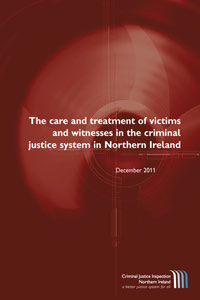
Further change necessary to address the needs of victims and witnesses
CHANGING the ethos of the criminal justice system in Northern Ireland so that it becomes more service centred in how it engages with victims and witnesses would be a major step forward in reducing continuing levels of dissatisfaction.
While there have been improvements in the way the criminal justice system treats victims and witnesses, Criminal Justice Inspection Northern Ireland remains concerned about the significant minority who are dissatisfied.
This is the thrust of an inspection report published today and a follow up to one produced in 2005. At all times it is the role of CJI to provide independent scrutiny of the conditions for and treatment of, users of the criminal justice system, in particular victims and witnesses, children and young people, prisoners and detainees.
“Undoubtedly there have been improvements in the way the system interacts with and treats victims and witnesses,” said chief inspector, Dr Michael Maguire. “But there remains a significant number of people who feel dissatisfied given their experience.
“The Inspectors heard numerous accounts from victims and witnesses who spoke of ‘delays’ in the system, poor communication and updating on case progression, a lack of co-ordination between the agencies and a general lack of support as people progress through the justice system.
“The treatment of victims and witnesses is a complex and difficult area for justice organisations, but the time has come for us to create more of a criminal justice ‘service’ that focuses to a greater extent on all the stakeholders in a crime, addressing individual needs, as well as finding someone guilty or not-guilty.”
The report urges justice organisations in Northern Ireland to make an extra effort to be responsive, engage with and deal with the issues raised by victims and their families as they undertake their work.
“At a strategic level there are six recommendations, amongst which, a need was identified for improved co-ordination across the justice agencies and ‘victims champions’ within each justice organisation. The Report recommended the establishment of Witness Care Units (WCUs) like those already working in England and Wales,” said Dr Maguire.
“We believe these units can help achieve greater consistency and co-ordination among justice agencies while providing a single point of contact for victims and witnesses who are called to give evidence at court, helping to meet their needs in a more satisfactory way.
“In addition, there is a need for better clarity of responsibility in relation to who is accountable for meeting the needs of victims as they progress through the justice organisations. A common issue raised was the need for improved communication and updating on progress.”
At an operational level the inspection also identified a need for improved consistency of service within the PSNI, improved communication by the PPS and better case management across the entire justice system to reduce the problems of avoidable delay.
“Improved services for victims and witnesses will not simply grow out of improvements in current approaches to service delivery and indeed may be counter to existing ways of doing business,” said Dr Maguire. “ Despite these concerns there were many positive developments since previous work was undertaken.”
This report is the third inspection into the experience of victims and witnesses conducted by the CJI since 2005. Of the 37 recommendations made in the initial report only two remain outstanding with the report. Much work has been done thus describing this as a ‘creditable performance’.
View full report.
View Ebook summary.